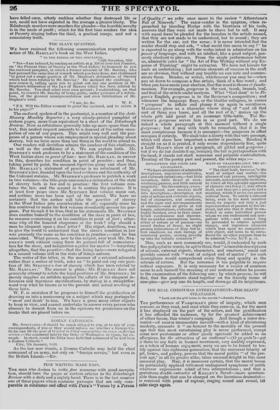THE SLAVE QUESTION.
WE have recieved the following communication respecting our notice of Mr. BARCLAY'S hook on the West Indies.
" TO TIDE EDITOR OF THE SPECTATOR.
"24th December, 1828. " SIR—I am induced,by reading art article at p. 396 of your last Number, on' the Present State of Slavery in the West Indies,' to transmit to you the enclosed pamphlet, in which a former advocate of Mr. Barclay, who had pursued the same line of remark which you have done, was challenged ' to point out a single position of Mr. Stephen's delineation of Slavery which had been refuted by Mr. Barclay' He declined the challenge. I now renew it, calling upon you to point out any one position in Mr. Stephen's delineation of the Lax of Slavery which has been refuted by Mr. Barclay. You shall select your own ground ; I undertaking, on that point, to convict Mr. Barclay of being guilty, under pretence da. refuta- tion, of the grossest misrepresentation and even falsification of Mr. Stephen's work. "I am, &c. ta.c. W. F.
" P.S. Will the Editor consent to print the enclosed, and to refute it in his pages?"
The enclosed, spoken of in the postscript, is a number of the Anti- Slavery Monthly Reporter; a very closely-printed pamphlet of sixteen pages, more than equivalent to a sheet of the Edinburgh Review. Now as refutations generally take up more space than the text, this modest request amounts to a demand of the entire occu- pation of one of our papers. This might very well suit the pur- poses of a person whose sole employment is special pleading about slavery, but we have more than one thing in the world to attend to. Our readers will doubtless admire the candour of this challenge, as well as the confidence of it. We can explain both. Mr. STEPHEN'S work professes to be a statement of the condition of the West Indian slave in point of law : now Mr. BARCLAY, in answer to this, describes his condition in point of practice; and thus, taking point by point, the meanest leguleius going can show that Mr. BARCLAY'S statement of practice is no rebutment of Mr. STEPHEN'S law, founded upon the best evidence and the authority of the Colonial statutes. Mr. STEPHEN'S professes to publish a work in two volumes—the title-page announces a delineation of the state of slavery both in law and in practice : the first volume con- tains the law, and the second is to contain the practice. It is at least four years since Mr. STEPHEN first volume came out, and nothing more has been said of the second. We have no certainty that the author will take the practice of slavery in the West Indies into consideration at all; especially since he has contrived to make his first volume abundantly answer his pur- pose. For though it be true, that in his statements Mr. STEPHEN does confine himself to the condition of the slave in point of law, he reasons concerning it on his condition in point of fact; other- wise why all the boasted eloquence of the work ? why should a man be eloquent upon a dead letter ? His object, doubtless, was to give the world to understand that the slave's condition in law was precisely the same as his condition in practice ;—and he has succeeded. What person, new to the subject, ever read Mr. STE- PHEN'S work without rising from its perusal full of commisera- tion for the slave, and indignation against his master ?—forgetting altogether, that the practice—that the living facts—were relegated to a second volume still in the state of things unborn.
The writer of this letter, in the manner of a retained advocate rather than a seeker of truth, asks us " to point out any one posi- tion of Mr. STEPHEN'S law of slavery which has been refuted by Mr. BARCLAY." The answer is plain : Mr. BARCLAY does not generally attempt to refute the legal positions of Mr. STEPHEN; he merely supplies an antidote against the effects of his eloquent in- ferences and ingenious mystitications, by stating in a straightfor- ward way what he knows as to the present and actual working of these laws.
W. F. is mistaken if he proposes to himself the gratification of drawing us into a controversy on a subject which may perhaps be " meat and drink" to him. We have a great many other objects to keep in view, and cannot undertake to answer every person who chooses to dissent from us in the opinions we pronounce on the books that are placed before us.


















 Previous page
Previous page